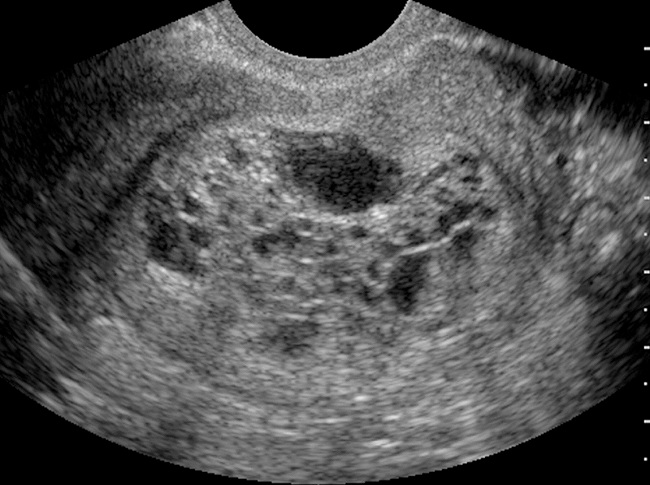Intrauterine fetal death is a great tragedy that theoretically can happen to every woman. It is especially difficult to transfer to later dates when the mother already felt the movements of her baby. However, do not despair and lose hope for the birth of a healthy child, because the couple has every chance that they will have a child after some time.
information Fetal death at more than 12 weeks of gestation refers to non-developing late pregnancy, and starting from 22 weeks, it goes into the category of antenatal fetal mortality.
Symptoms
important The main sign of intrauterine fetal death after 20 weeks for a woman is that she ceases to feel the movement of her baby. Reduced subjective sensations that occur during pregnancy (nausea, vomiting, breast enlargement).
The belly also stops growing, decreases. Further, pains in the lower abdomen may join,. The appearance of these symptoms indicates the onset of termination of pregnancy.
Diagnostics
The main method for diagnosing antenatal fetal death is the absence of a heartbeat during ultrasound (ultrasound) and cardiotocography (can be performed from the 26th week of pregnancy).
Determining the level of chorionic gonadotropin is not relevant in the later stages.
Treatment
Termination of pregnancy is performed only in a hospital under the close supervision of medical personnel. Depending on the period, there are several methods of treatment:
- The use of prostaglandins (substances that cause cervical dilatation and contractions);
- Introduction to the amniotic cavity of hypertonic (saline solutions);
- Expansion of the cervical canal and evacuation of the contents by the type of abortion (only up to 16 weeks of pregnancy);
- Hysterotomy (surgery on the uterus) in case of emergency;
- Artificial childbirth after 22 weeks;
- Combined Methods
The optimal method for terminating a pregnancy in the later stages is the method that is as close as possible downstream to childbirth. To do this, it is necessary to prepare the cervix and cause the contractile activity of the myometrium (the muscular layer of the uterus).
It is necessary to prescribe antibacterial agents to prevent inflammatory processes of the pelvic organs. In the early days, they are usually administered intravenously or intramuscularly, then they switch to tablet forms.
Rehabilitation
Highly importance has a rehabilitation of a woman after a frozen pregnancy in the later stages, both therapeutic and psychological. The treatment includes:
- The use of hormonal contraceptives for 3 months or more (contributes to the fastest recovery of the organs of the reproductive system, normalization of hormonal levels);
- The use of multivitamin preparations to increase the body's resistance as a whole;
- The appointment of sedatives that contribute to the normalization of the nervous system;
- Treatment of concomitant pathology (diabetes mellitus, hormonal disorders, cardiovascular diseases, and others);
- Control ultrasound of the pelvic organs 7-10 days after the termination of pregnancy.
Psychological rehabilitation is no less important, since mental injuries are much stronger than bodily ones. It is necessary to seek psychological support, and it is good if you do this together with your husband.
additionally You can plan a subsequent pregnancy no earlier than after 6 months. During this time, it is necessary to be examined for sexually transmitted infections, to achieve remission in the presence of concomitant diseases, to examine the endocrine system.
Consequences and prognosis for the next pregnancy
With timely and proper treatment of fetal fading, 80-90% of couples are able to conceive and give birth to a healthy child. Subsequent pregnancy comes and goes without any deviations. Rather, the psychological aspect causes more trauma, especially in the later stages. Do not despair, treat this as an inevitability, because it is unlikely that the fetus would be viable after birth.
If intrauterine fetal death recurs, it is necessary to examine in detail together with the spouse to determine the cause.
Soaring in the clouds in anticipation of a child and falling to the ground, having survived a frozen pregnancy - the grief of a failed mother knows no bounds. It does not matter if it happened some time after conception or in the middle of pregnancy. There are always more questions than answers: for what, why, what to do now? We will talk about the mechanism of the extinction of the life of the embryo (fetus) in the first weeks after conception and the consequences of the pathology for the health of a woman in the article.
The concept of "non-developing pregnancy" means the death of the child in the absence of visible symptoms of interruption of the "interesting" position. A frozen pregnancy at an early stage can befall any woman, regardless of her age. Fortunately, this unfavorable phenomenon does not put an end to motherhood - a woman's subsequent attempt to give birth to a child can be crowned with success (unless the missed pregnancy has had time to acquire the features of habitual miscarriage).
Why Pregnancy Fails Early
Statistics say that most often misfortune can happen to a future mother precisely on initial stage pregnancy, first trimester. The increased risk of fetal life-extinction persists up to the 8th week of the special situation. It is during this period of gestation that the most significant metamorphoses occur in the formation of tissues, organs and systems of the future person. This means that the slightest unplanned interference in this subtle process can most deplorably violate the mystery of the birth of life, and living cells stop functioning. Unfortunately, many factors can affect the development of the embryo without the knowledge of the pregnant woman herself.
We hasten to note that the consequences of the baby’s fading at an early stage of its existence cause less harm to the mother’s body than a frozen pregnancy at a later date, when the child is already sending signals to the woman in the form of movements.
This, of course, is about the physical condition of the pregnant woman, and not about the psychological trauma that this pathology inflicts on her. The unfortunate woman, who most of all dreamed of a child, is experiencing severe mental anguish, regardless of how long she heard the sad diagnosis. Nevertheless, any professional psychologist will advise a failed mother not to despair and not to give up, but to move on. This means that, having found out the causes of the pathology and accepting misfortune as a natural phenomenon of natural selection, you need to enlist the support of specialists and try again - the chances of bearing a child without problems after a previous missed pregnancy are quite high for every woman.
Causes of missed early pregnancy
With all the high level of development of modern scientific and diagnostic medicine, it is not always possible to understand why the intrauterine development of the baby was interrupted. There are a lot of factors that can disable the natural mechanism of procreation, but getting to the bottom of the original source is not so easy. In addition, the situation is most often complicated by a short gestation period: at this stage of gestation, the embryo either copes with the influence of a combination of aggressive factors and continues to gain strength, or dies.
Let's look at the reasons why doctors explain missed pregnancy most often.
Genetics.
The genetic factor is an indomitable thing, and we have to take it for granted. Sometimes the life that barely had time to appear inside the mother fades away only because of its failure due to genetic damage. Spoiled material is immediately rejected by the body - this is the law of nature, nothing more.
Infection.
The second most common cause of miscarriage is called infectious diseases, to which a pregnant woman with a weakened immune system is especially susceptible. Today, there is a great variety of pathogenic microorganisms, and, quite likely, with some of them defensive forces organism expectant mother won't be able to cope. Potential hazards include cytomegalovirus, herpes simplex virus, respiratory infections, chlamydia, gonococci, and others.
Once in the general circulation, the infection opens up free access to the embryo. It can disrupt the process of cell division, which will cause a genetic failure, which we have already discussed earlier.
immunological diseases.
Sometimes parents or the expectant mother in particular become an indirect cause of the death of the embryo. For example, the biological material of the parents may be incompatible (then the female body rejects the embryo as a foreign body) or a serious illness of the mother (for example, systemic lupus erythematosus) leaves the embryo no chance of survival.
Endocrine pathologies.
Such phenomena as a sharp deficiency of progesterone (the hormone “protects” the embryo), an excess of androgenic hormones in the female body, and pathological conditions of the thyroid gland can destroy life in the embryo.
Other factors.
Let's not forget that pregnancy does not always proceed in ideal conditions. The condition of the embryo can be affected by the wrong way of life of his mother (for example, a woman has bad habits) and unfavourable conditions the environment in which a woman lives (stress, radiation, contact with hazardous chemicals).

Symptoms of a missed pregnancy in the early stages
When something wrong happens with pregnancy, the expectant mother will definitely feel it. For example, the body reports a spontaneous abortion with a strong pulling pain in the lower abdomen, a palpable feeling of tension in the uterus (increased tone) and discharge of blood clots from the vagina.
Quite the opposite, unfortunately, is the case when the fetus freezes. Not only does the pregnant woman not worry about any suspicious symptoms, but she may not even know what happened for several weeks! A set of minimal warning signs, of course, exists, but not every woman will pay attention to them and sound the alarm.
When the intrauterine death of the embryo occurs, the woman ceases to feel pregnant, that is, her subjective feelings from her position gradually decline:
- the breast becomes soft and less sensitive;
- the high susceptibility to smells decreases;
- unusual gastronomic preferences disappear;
- no more nausea and vomiting;
- drowsiness goes away.
The danger lies in the fact that as the gestational age increases, the disappearance of all these symptoms can be a natural phenomenon, and the pregnant woman comes to the doctor with complaints only after the appearance of bloody smears on her underwear, when the rejection of the embryo begins.

Methods for determining missed pregnancy
Detect and confirm the fact of non-developing pregnancy on early dates quite difficult, since the heartbeat is not yet audible, and other symptoms, as we have already found out, become apparent only a few weeks after the embryo freezes.
As a rule, the pathology can be fixed on the procedure of ultrasound and visual examination by a gynecologist. As auxiliary methods of diagnosis, a blood test is done for the concentration of chorionic gonadotropin, and the basal temperature of a pregnant patient is also studied.
Frozen pregnancy on examination
A specialist will certainly examine a patient with a suspected missed pregnancy on a gynecological chair. The gynecologist needs to know the size of the uterus and assess the condition of her cervix. If the volume of the uterus does not correspond to the gestational age, the ultrasound procedure will help confirm or refute suspicions about the death of the embryo. Smaller than the average size of the genital organs for some women is the norm, therefore, in the search for truth, ultrasound research is of particular importance.
Frozen pregnancy on ultrasound
It looks like a frozen pregnancy at an early stage in the photo:

The doctor will explain to the patient that the disturbing symptoms of stopping the development of the embryo at the very beginning of pregnancy are deformed fertilized egg with torn contours, as well as its location at the bottom of the uterus. Starting from the 5th week of gestation, when determining a non-developing fetus, doctors already focus on the presence of a heartbeat, and also pay attention to the correspondence of the gestational age according to ultrasound and menstruation.
In order to exclude an error in the diagnosis, the pregnant woman will be invited for an ultrasound again, in a week. The fact is that the difference between the embryonic period and the period for menstruation does not necessarily indicate a pathology. If a woman’s monthly cycle has always been irregular, if the patient has a history of hormonal disorders or ovarian diseases, then the gestational age may not coincide by 3 or even 4 weeks.
If a repeated ultrasound examination shows that the size of the fetal egg remains the same as a week ago, the diagnosis of "non-developing pregnancy" will become final.
HCG with a missed pregnancy in the early stages
The concentration of chorionic gonadotropin in the blood of the expectant mother reliably reflects the state of the embryo in the first weeks of pregnancy, when the heartbeat cannot yet be heard. During the examination, the dynamics of the hormone is studied: when everything is in order, its level increases almost 2 times every day. For this, a pregnant woman gives blood for analysis several times.
If the embryo does not develop, then the hCG levels remain unchanged or lower in relation to the results of the previous analysis. A stable increase in the level of a specific substance in a woman's body indicates the natural development of pregnancy. For example, in the first 5-7 days after fertilization of the egg, the concentration of the hormone will increase by more than 5 times compared to the normal hCG for non-pregnant women.
Sometimes analyzes show an increase in the hormone even with a non-developing pregnancy, but in this case the dynamics are quite insignificant and differ sharply from normal indicators with the successful development of the embryo.
Basal body temperature during missed pregnancy
Let us make a reservation right away that this method cannot be considered diagnostic in full, when we are talking about an undeveloped pregnancy. On change basal body temperature bodies can be influenced by many factors, therefore, this indicator can only indirectly indicate the state of the embryo.
Basal temperature is measured by inserting a thermometer into the rectum immediately after waking up, at the same time. Progesterone, the level of which in a woman's body rises sharply with the onset of pregnancy, increases body temperature to 37.2 - 37.5 degrees. If the embryo froze, the level of the pregnancy hormone drops sharply and the body temperature accordingly drops to normal levels.

Frozen pregnancy is confirmed: what measures to take
When a sad diagnosis becomes a reality, the woman must be urgently hospitalized. In case of a non-developing pregnancy in the early stages, the patient will have an operation, during which the dead embryo or fetus with its membranes is removed.
At later stages of pregnancy, a gentle vacuum aspiration method is used to cure the fetus - the contents of the uterus are removed with a special vacuum suction. If the fetus has grown enough, a scraping operation is performed like an abortion. Surgery in both cases takes place under general anesthesia.
At the discretion of the doctor, in case of a missed pregnancy, the so-called expectant treatment and medical termination of pregnancy can be used. The practice recognized these methods as the most gentle and sparing in relation to the health of the patient, provided that the process is under vigilant medical supervision.
Rehabilitation of a woman after a frozen pregnancy
The recovery period is a very important time after an accident. It is now that the foundation is being laid for the next successful pregnancy, so all the recommendations of specialists to the patient must be taken very carefully and responsibly.
As a rule, in such cases, oral contraceptives are prescribed for 3 months, complex treatment of infectious diseases of the genital organs and hormonal disorders (if any).
Of great importance is the psychological rehabilitation of women. Consultation with a competent psychologist, a change of scenery and support from relatives will help the patient quickly recover.

Is there a chance for happiness?
If the consequences of a missed pregnancy were professionally and carefully eliminated, and the rehabilitation period was successful, the woman is not threatened with adverse consequences.
The prognosis after an experienced non-developing pregnancy is generally favorable. Almost all women who, by chance, have encountered such difficult situation, in the future become mothers healthy babies. But if what happened was the result of any specific disease of the patient or a missed pregnancy happens again, the woman needs to seek qualified medical help to clarify the situation - perhaps the reason lies in the disorder of her hormonal levels or immunity.
You can think about the next pregnancy no earlier than six months after the previous one. This is the minimum time required for the body to recover and get stronger. The main thing is to think positively and hope for the best.
Frozen pregnancy. Video
Missed pregnancy is a pathological condition characterized by the death of the fetus in the womb. Statistics show that despite modern technologies in diagnosis and prognosis, miscarriage accounts for 10-20% of cases. Most of these cases occur in the early stages of pregnancy.
If we take into account the cases of biochemical pregnancy, when the interruption occurs in the first week and the woman is not yet aware of her condition, then the percentage of missed pregnancies becomes even higher. Complications are the most dangerous. That is why you should be responsible for the examination during childbearing and compliance with all the recommendations of doctors.
What is a frozen pregnancy?
For normal development the embryo, and subsequently the fetus, a number of conditions are necessary, in violation of which its death occurs. We can assume that this is a normal protective measure that does not allow the development of a damaged organism. In medicine, this condition is called a failed miscarriage. This means that the death of the embryo or fetus occurs, but there is no abortion. That is, cadaveric tissue remains in the body of a woman, which can lead to serious complications, including sepsis and death.
Why does a frozen pregnancy occur?
The causes of this pathological condition can be any damaging factor from the external environment, the mother's body or the body of the fetus itself. It happens that there is no obvious reason for the fading of pregnancy. But this rarely happens. Knowing the causes of fading, parents can take action and prevent this condition.
Environmental reasons
- Smoking, alcohol or drug use by a pregnant woman. Cigarette smoke has a detrimental effect on fetal development even in passive smoking when someone smokes in the presence of a pregnant woman.
- Poisoning by vapors of chemicals such as formaldehyde, ethylene oxide and others. Intoxication with these substances can lead to fetal fading even in late pregnancy.
Mother's reasons
- Disorders of the endocrine system (diseases of the thyroid gland, adrenal glands, ovaries). The hormonal background of a woman has a very important influence on the development of pregnancy.
- Autoimmune diseases. These are diseases in which the mother's immune system perceives her own organs or tissues (in this case, germ) as alien.
- Infections. Some viruses and bacteria can stop the development of the fetus. For example, cytomegalovirus, herpes virus, toxoplasma, rubella virus, chlamydia, Trichomonas, gonococcus, mycoplasma and others. A woman may not even notice the presence of an infectious disease in herself, and for the fetus it will be fatal.
- Insufficient or overweight. Low maternal body weight can lead to at least retardation syndrome prenatal development fetus, and in the worst case - his death. Excess weight can lead to the development of diabetes in the fetus and, as a result, its death.
- Malformations of the female genital tract. It can be a “childish” (underdeveloped uterus), a bicornuate uterus, a pathological septum in the uterus, and so on.
- Diseases of the genitourinary system. Inflammatory processes in the uterus (endometritis), neoplasms in the uterus (fibromyoma, leiomyoma).
- Taking medication. For example, long-term use of non-steroidal anti-inflammatory drugs (Aspirin, Ibuprofen, Indomethacin) or steroid (hormonal) drugs can cause medical abortion. There is a blockage of progesterone, which is responsible for the growth of the endometrium (one of the membranes of the uterus), then the uterus contracts, the fetus dies and is rejected.
- Chronic pathology of the internal organs: heart (malformations, infective endocarditis, heart failure), kidneys (hydronephrosis, chronic pyelonephritis or glomerulonephritis, renal failure), liver (hepatitis, liver failure), blood (anemia of 2-3 degrees, leukemia).

Causes on the part of the fetus
- Genetic and chromosomal abnormalities. These are the defects that develop in the first hours after conception, when the genetic apparatus of the sperm and the egg merge. These hours are very important for the baby's body, because if something goes wrong, the child's internal organs will also suffer. Until a certain period, the embryo grows, the cells divide, and then death occurs. As a rule, this happens before the 8th week of pregnancy, sometimes fading in these cases occurs at 12-13 weeks.
- Anembryony is a serious complication in which the cells of the embryo stop dividing in the first weeks of pregnancy. As a result of this, the placenta and the fetal egg continue to develop, but there is no embryo in it. At this stage, there may be an ultrasound error when the fetal egg is perceived as a normally developing embryo. Sooner or later, such a pregnancy ends with an interruption.
Symptoms of a missed pregnancy
The danger is that fetal fading may not immediately show symptoms. That is, for some time a woman may experience signs of pregnancy. Often they ask - can there be toxicosis with a frozen pregnancy. Yes maybe. Some time after the death of the fetus, the woman still experiences nausea, a refined sense of smell and instability of emotions. But after 1-5 days, there are obvious symptoms of a frozen pregnancy.
- Vaginal discharge. As a rule, this bloody issues. In terms of volume, they are more plentiful than during normal menstruation, and are more like bleeding. If fading is combined with a miscarriage, then the discharge will be with clots, astringent.
- Pain. In the early stages, pain in the lower abdomen may indicate an incipient miscarriage, this will not happen when it fades. But in the later stages, pain, on the contrary, is a symptom of fetal death.
- The chest stops swelling and hurting. This is especially noticeable in early pregnancy.
- The basal body temperature during a missed pregnancy returns to the previous numbers, as before the onset of pregnancy.
- Body temperature can rise only in the case of a long stay of a dead fetus in a woman's body. In this case, tissue decomposition and a strong inflammatory process begin.
- The level of hCG during a frozen pregnancy gradually decreases. To confirm the fading of the fetus, you need to conduct several tests and track the degree of decrease in the level of the hormone.
- No sensation of fetal movement. This symptom is reliable in late pregnancy.

How long can a missed pregnancy be?
On any. Starting from the very first hours after conception (then we are talking about biochemical pregnancy and its fading) and ending with the last weeks of pregnancy (which is most difficult for a woman to endure).
With a frozen pregnancy, is the test positive or negative?
After the fetus freezes, the test may remain positive for several weeks. It is not a reliable confirmation of pregnancy.
How to survive the loss?
Psychologists recommend not to experience this state alone. There are specialists (perinatal psychologists) who help to survive the psychological consequences of a missed pregnancy. It should be remembered that in addition to psychological trauma, a woman also receives physical trauma, violations of the reproductive system. And before a subsequent pregnancy, a woman needs to undergo a thorough examination in order to prevent the recurrence of fading.
There is also such a thing as psychosomatics. This influence psychological state person on his physical health. Studies show that a woman who is afraid of becoming a mother increases the risk of miscarriage. The same thing happens with anxious, nervous women.
What to do to avoid missed pregnancy?
After removing the tissues of a dead fetus, histology is performed - a study under a microscope. It allows you to identify the cause of a missed pregnancy. After establishing the cause, the preparation of the woman for the next pregnancy begins.
In addition to the histological examination of fetal tissues, it is recommended to undergo the following examinations:
- Ultrasound of the pelvic organs to detect pathology of the genitourinary system;
- a blood test for the presence of autoantibodies and autoimmune diseases;
- swabs from the genital mucosa to detect sexually transmitted infections;
- a study of the thyroid gland to detect hormonal disorders in a woman's body;
- examination for TORCH infections, which are deadly for a child;
- consultation of a geneticist to identify the likelihood of chromosomal and genetic abnormalities in a child.
How long can you walk with a frozen pregnancy?
The death of the fetus entails the decomposition of dead tissues. If you stretch this process in time, then inflammation will begin in the uterus. Everything can end with blood poisoning (sepsis) and the death of a woman. Therefore, you do not need to walk with a frozen pregnancy even a day.
